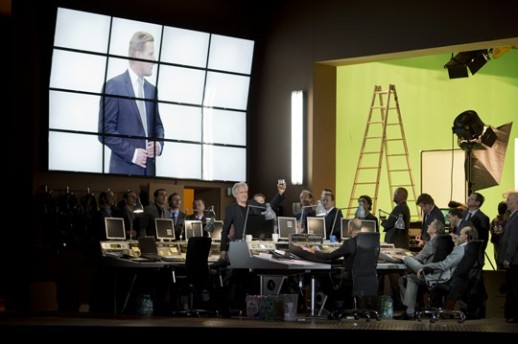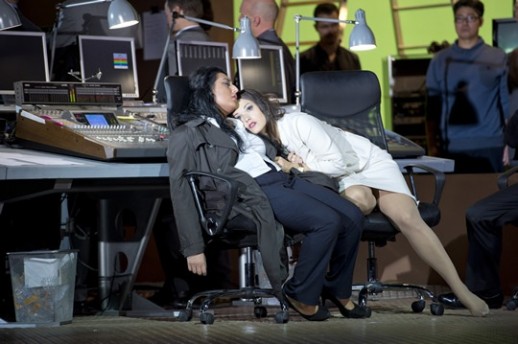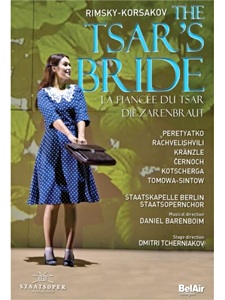
For all their orchestral and vocal attractions, Nikolai Rimsky-Korsakov’s 15 operas are rarities in the West. If The Legend of the Invisible City of Kitezh is staged in an upcoming Met season as rumored, it will be the theater’s first representation of the composer’s music since 1945 (The Golden Cockerel), and it took The Tsar’s Bride 112 years to make it to Covent Garden.
Bel Air Classiques’ DVD documents Dmitri Tcherniakov’s 2013 production of the latter opera, with Daniel Barenboim leading the Berlin premiere cast.
Per libretto, the year is 1572. The oprichnik Grigory Gryaznoy (baritone), tiring of mistress Lyubasha (mezzo), covets the merchant’s daughter Marfa (soprano), who is in love with young boyar Lykov (tenor). Gryaznoy plots to win Marfa with a love potion from the alchemist Bomelius (tenor), but the desperate Lyubasha replaces the love potion with poison she secures from Bomelius in exchange for sex. Meanwhile, Ivan the Terrible is seeking a bride from among thousands of maidens.
Although Marfa’s friend Dunyasha (mezzo) is the putative favorite, the tsar chooses Marfa, putting her out of reach of Gryaznoy and Lykov. Following the wedding, Marfa is mad and slowly dying from the poison. Gryaznoy frames and executes Lykov for the poisoning, but is so moved by Marfa’s distress that he confesses all and vows revenge on Bomelius. Lyubasha appears and reveals that she is the guilty one. Gryaznoy kills Lyubasha; Marfa expires.
To the surprise of no one familiar with his work, Tcherniakov dispenses with the 16th-century setting (after a wry fake-out with a period piece being shot in a studio), updating to a modern world of competitive reality shows such as Joe Millionaire. The information-packed staging of the overture sets the concept in motion. We see projected instant messages from the “Oprichnik Chat Room” in which the oprichniks scheme to create a CGI tsar and build a reality show around his bride. It is implied that there is something sinister about this programming; the goal is to distract and control the audience. An ideal tsar’s face (“the kind people like”) is created, in Orwellian fashion, as a composite of past Russian leaders.
The outer acts of the four-act opera take place in the television studio. The director himself designed a tripartite set with, from left to right, a conference room, control room, and soundstage with green screen. The set swivels as necessary. In the first act, Lyubasha moves from conference room to soundstage to sing for Gryaznoy and cohorts. When she finishes, the swiveling set maroons her there. No longer relevant to the man she loves, she recedes from his view and ours.
The middle two acts take place outside and within the home of Marfa and her father. In a visual scheme reminiscent of Tcherniakov’s production of Verdi’s Macbeth, the second act has us looking in through the living-room window, from the point of view of the spying Lyubasha. The window is a cutout within a projection screen, and projections around the window shift from foliage to faces of potential tsarinas.
Television is an easy target, and usually when a director shows us a TV in an opera, a play, or a film, some variation of the same point is being made: television is bad, and bad for you. We’ve been here before. The flat screen in Marfa’s living room is almost always turned on, and Marfa, her family and friends strike predictable poses, tuning out personal concerns to stare entranced at a “news” anchor (we never hear anything he says, but he looks vacuous), interrupted only by promos for show-within-show The Tsar’s Bride. At the point when Marfa would lock eyes with the real tsar in an orthodox production, this Marfa stares at the CGI one in the promo.

Time and again, lines land in unexpected ways that support the concept. When the assembled oprichniks, here television executives, praise “our wonderful tsar,” they are congratulating themselves for stirring up public interest. When Gryaznoy’s crony Malyuta adds, “Foreigners certainly praise him too,” he is eyeing other markets.
A little later, Malyuta fills in Lyubasha’s back-story, “We took her away from Kashira,” which could reference a rival studio, a PR firm, or some industry player (Lyubasha appears to be a junior exec). When Marfa’s father comments of the bride search, “At first there were 2,000 of them; now there are only twelve left,” it does sound like a breathless update on the winnowing of a televised competition. Even the libretto’s specified season, autumn, fits perfectly: fall TV.
Bomelius is a shy, awkward modern drug dealer, seeming to belong in neither of the opera’s worlds, that of Gryaznoy’s power players or that of Marfa’s bourgeois set. When Lyubasha asks him for a potion that will cause Marfa to lose her beauty little by little (her complexion should become less clear, her hair should lose its fullness, and so on), Ilia Tyumenev’s libretto is describing the consequences of more than one modern recreational drug.
Tcherniakov’s modernization creates one new association I found chilling. In the aria that follows the overture, Gryaznoy pines for Marfa, singing: “Before, if we liked a girl, at night, knocking down the door, we would take her away and that was it. We would come and go through the night. I took away a lot of girls and I had a fine time.”
In a traditional production, this would conjure images of historical raping and pillaging, horseback journeys from village to village, unsheathed swords. The “civilized” Gryaznoy of this production is of late middle age, gray-haired, expensively tailored and coiffed. He could be any wealthy, privileged 21st-century man in the entertainment world, old enough to be nostalgic for a time (perhaps the 1970s) when he harassed and violated young women with impunity.
When Lyubasha scopes out her rival, is struck by Marfa’s beauty, and decides to offer her body to Bomelius for the fatal potion, Tcherniakov goes off script: he has Marfa notice the distressed woman beneath her window and go outside to her. Lyubasha’s line “I have bought your beauty and paid for it with my virtue” is now in direct address to Marfa, who does not understand but tries to offer comfort. Her kindness torments Lyubasha more. This is Lyubasha’s mad scene, in counterpoint to her rival’s two acts later.
At the end of the opera, a memory of this strange encounter stirs something in mad Marfa. She caresses dead Lyubasha’s face and undoes a braid of her own hair to hang to the side in imitation. Each woman, we see, could admire the other’s distinctive beauty. Through madness and death there is a suggestion of peculiar understanding, communion. Behind the two women, one dead and the other getting there, the pathetic Gryaznoy, star player in the downfall of both, sucks up all the oxygen in the room, carrying on about his guilt, his misery, his feelings. It is as great a tableau as Tcherniakov has created.
Scenes involving the women are handled with uncommon tenderness, and this extends to the teen BFF interactions of Marfa and Dunyasha. Their big scene could have been mocking, and threatens to be, when Marfa has to show her friend every keepsake of her relationship with her childhood sweetheart. But the scene is buoyed by gentle, naïve fantasy that keeps it on the right side of send-up.
Darker tinges are never far off. There are hints that even the ingenuous Lykov could follow in the footsteps of the Gryaznoys of the world. Lykov seems all too receptive to the “this one or that one” counsel of the older man, who has a beautiful younger mistress but wants a more beautiful, still younger one.
The transformation of Johannes Martin Kränzle into this slick Gryaznoy is testament to his versatility. To the ear of this non-speaker, he sounds to be feeling his way carefully through the Russian language, but he meets musical and stylistic demands and is an energetic and imaginative actor. Stephan Rügamer gives Tcherniakov the understated, nerdy Bomelius the production requires.
As the prosperous father Sobakin, veteran Anatoli Kotscherga appears to enjoy himself in the modern setting (elsewhere on DVD he was Tcherniakov’s Gremin and Dosifey). While his seniority is apparent and he struggles to sustain one low note, he knows how to put across the Act IV aria of concern for his stricken daughter, one of those gravely beautiful bass numbers without which no Russian opera is complete.
The 72-year-old Anna Tomowa-Sintow, playing Dunyasha’s mother, now has a tremulous voice of limited color and power. It would be a devoted fan indeed who wished for her narration of the bridal contest to go on longer, but one is happy to see her again.

Anna Lapkovskaya, a Berlin Staatsoper regular who managed to command attention as Ines to Anna Netrebko’s first Leonoras, again makes a strong impression and leaves one wanting more as Dunyasha.
Anita Rachvelishvili is the clear audience favorite, and the audience gets it right. While listening to the Georgian on this occasion, one feels that Lyubasha is a great mezzo-soprano role being served by a golden-age exponent. Rachvelishvili has an earthy charisma in both voice and presence, and her unaccompanied folk song in the first act is suffused with yearning that makes it, and Lyubasha herself, seem both contemporary and timeless.
These few minutes help sell the entire production. To keep this Lyubasha sympathetic is a tall order. However much Lyubasha owes to her association with Gryaznoy, a successful 21st-century woman would have options not available to a 16th-century one. Her desperation could ring false. A-Rach somehow holds sympathy through everything – a riveting, deeply felt, major performance.
A few months following this taping, the production traveled to Barenboim’s other operatic base, La Scala, with most of the cast intact, the excellent Marina Prudenskaya replacing A-Rach. In Berlin, choral scenes have a slight sogginess to them, and I could imagine another conductor and ensemble better highlighting subtleties of color that make Rimsky-Korsakov’s late Romanticism distinct from that of other composers. Still, two and a half hours with the Staatskapelle Berlin, especially its wind section, is always time well spent.
The director Peter Konwitschny once remarked, in distancing himself from what is called “Regietheater”: “[T]hese directors present one single idea, such as for example staging Rigoletto in an empty swimming pool or in a slaughterhouse. These ideas are not consequentially followed through and explored, and in most cases, the singers stand next to each other on stage just as unconnected as in conventional productions.”
He suggested instead “a dialogue with the audience about essential themes in society as well as in the lives of the individual.” Tcherniakov in The Tsar’s Bride provides a model of the latter approach. He and his cast have pushed past gimmickry to achieve something fresh, entertaining, perceptive, and not easily shaken off. If tsars are only painted on the ceiling above, then who can you turn to, and who do you love?
Merry Widow | Finger Lakes, NY | July 25-28
Geneva Light Opera’s production of Lehar’s The Merry Widow will feature prize-winning baritone Bryan Murray and soprano Alexis Olinyk in the superb acoustics of in the landmark Smith Opera House in Geneva, New York on July 25, 27, and 28. A small city on the north end of the largest of NY’s Finger Lakes, Geneva…
Geneva Light Opera’s production of Lehar’s The Merry Widow will feature prize-winning baritone Bryan Murray and soprano Alexis Olinyk in the superb acoustics of in the landmark Smith Opera House in Geneva, New York on July 25, 27, and 28. A small city on the north end of the largest of NY’s Finger Lakes, Geneva…
-
Topics: cgi, daniel barenboim, dmitri tcherniakov, dvd, review
Latest on Parterre
Reach your audience through parterre box!
parterre box, “the most essential blog in opera” (New York Times), is now booking display and sponsored content advertising for the 2023-2024 season. Join Carnegie Hall, Lincoln Center, Warner Classics and many others in reaching your target audience through parterre box.
parterre box, “the most essential blog in opera” (New York Times), is now booking display and sponsored content advertising for the 2023-2024 season. Join Carnegie Hall, Lincoln Center, Warner Classics and many others in reaching your target audience through parterre box.
parterre in your box?
Get our free weekly newsletter delivered to your email.


























Comments